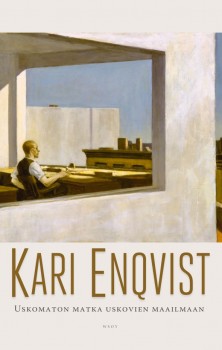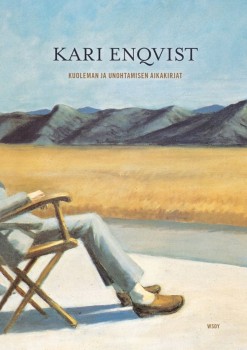Tag: science
In one hundred springtimes
23 November 2012 | Extracts, Non-fiction
 Extracts from Uskomaton matka uskovien maailmaan (‘An unbelievable journey into the world of the believers’, WSOY, 2012)
Extracts from Uskomaton matka uskovien maailmaan (‘An unbelievable journey into the world of the believers’, WSOY, 2012)
In his new book the writer, professor of cosmology, a scientist without a religion Kari Enqvist explores religiosity, how it manifests itself in present-day Finland, in various churches and parishes. How will the expanding scope of science and secularisation change the world and the forms of spirituality in the course of the next century?
When, in July 1969, Neil Armstrong climbed down the ladder on to the surface of the Moon, it was a huge propaganda coup for both the United States and the scientific world view. Manned space flights as a way of gaining knowledge are both ineffective and brain-numbingly expensive, but it is hard to imagine a stronger individual and universally understandable demonstration of the superiority of the scientific world view than an astronaut on the surface of a foreign celestial body. Everyone can recognise it as a triumph of both engineering technology and the hard sciences.
But the astronaut solution has been tested already, and I do not believe that space travel will expand our consciousnesses in the next century. It is possible that we will not even have visited Mars. Fantasies about manned flights to other stars are, in my opinion, utopian in the extreme and I do not really believe that humans as physical beings will ever leave the solar system. Journeys to the stars are inconceivably long and so expensive that they cannot be embarked on merely in order to fulfil the Buck Rogers fantasies of teenage boys. Carrying humans to the closest one, alpha Centauri, a mere four light years away, would take, at best, hundreds of years (we can dismiss rockets that travel at the speed of light as mere scientific fantasy). Even if deep-freezing to slow vital functions were possible, it would make as much sense to pay hundreds of billions to freight pig carcasses to the planets. For everything that human beings can do can be done better – and, more importantly, more cheaply – by machines. Even if the spirit were willing, the flesh is so weak that silicone beats it hollow.
So it is my guess that in place of the macrocosmos the scientific world view will seek consolidation in the microcosmos. As a cosmologist, I am not happy to admit this, but admit it I must. More…
Everyday life at the Science Forum 2011
20 January 2011 | In the news

‘Everyday life’ in focus: scientific approaches. Picture: Elina Warsta
This year’s Science Forum took place in Helsinki between 12 and 16 January. This biennial science festival – which has existed in its current format since 1977 – invites a wide audience to lectures, debates, discussions and various other events where scholars introduce their branch of research and science. This time the theme was ‘Science and everyday life’.
The Science Forum is organised by the Federation of Finnish Learned Societies, the Finnish Academies of Sciences and Letters and the Finnish Cultural Foundation.
In Finnish, the word for ‘everyday life’ is arki. Professor of Consumer Economics Visa Heinonen defined arki as follows: ‘Scientifically arki cannot be defined undisputably. An individual experiences the everyday as a ‘stream’ of life. Arki is mostly the recurrence of the small basic elements of life and the constant renewal of the prerequisites of existence. The everyday contains much that is routine as well as small moments of joy. Carpe diem, seize the moment, might be a good guideline to life.’
Among the Forum’s topics were the everyday work of scientific research and its significance for the development of everyday life in society, dimensions of consumer culture, multicultural society, religion, the arts and the media, technological advances in food production and the built environment, future energy sources and the global economy.
The Science Forum attracted 18,000 visitors, in addition to the 3,000 who participated in the Forum via the Internet. The five most popular topics, or sessions, were those entitled ‘Good life’, ‘Ageing as a biological phenomenon’, ‘Nanotechnology changing everyday life’, ‘Sleep – a third of life’ and ‘Food and everyday chemistry’.
In the detail?
11 December 2009 | Essays, Non-fiction
 Extracts from Kuoleman ja unohtamisen aikakirjat (‘Chronicles of death and oblivion’, WSOY, 2009)
Extracts from Kuoleman ja unohtamisen aikakirjat (‘Chronicles of death and oblivion’, WSOY, 2009)
What’s the meaning of life? There are those who seek it in religion, while for others that is the last place to look. The scientist Kari Enqvist ponders why some people, including himself, seem physiologically immune to the lure of faith. Perhaps, he suggests, we should look for significance not in the big picture, but in the marvel of the fleeting moment
As a young boy I must have held religious beliefs. However, I cannot pinpoint exactly when they disappeared. At some point I eventually stopped saying my evening prayers, but I am unable to remember why or when this happened. ‘I was born in a time when the majority of young people had lost faith in God, for the same reason their elders had had it – without knowing why,’ writes the Portuguese poet Fernando Pessoa in The Book of Disquiet. More…
